Month: April 2022
Apps for Parents: Market Overview, Types, and Examples
Making parenting easy
Before I was born, my parents considered parenting pretty easy: just feed the baby and keep it dry, that’s all. That’s what they thought. However, after I was born they discovered that there were a thousand little details they hadn’t even thought about. At that time they didn’t have any ways to find out what to do with most of these problems except to ask doctors and their neighbors who already had a child.
New devices and technologies give parents lots of new opportunities to make parenting easier.
Today, parents have hundreds of tools allowing them to feel more confident about bringing up a child. Books, guides, internet articles, and videos all give lots of information people can easily access.
Mobile apps are by far the most advanced and capable tool of all, as they not only can provide parents with information but also use device capabilities like cameras, geolocation, accelerometers, internet access and more to guide parents.
Parents are looking for answers on the internet more than ever, as they hear lots of advice from everywhere and it’s a rare case when people have a single opinion on how to raise children properly. This is when applications come in handy — they allow parents to get all the information they need at any moment and in any place.
Though there are already lots of mobile solutions for parents, the demand for them is still high. New devices and technologies give parents lots of new opportunities to make parenting easier. Let’s explore the most popular types of applications for parents and look at some examples.
Parenting app market
The global parenting app market size is expected to grow from $1.1 million to almost $2.5 million by 2029 showing a CAGR of 12.1% over these years. Parental control apps, however, are only one kind of applications for parents that are becoming more and more popular each year. The COVID-19 pandemic contributed to the growth of popularity in parental apps of all kinds, as kids started spending even more time online, and parents needed to find ways to limit and control their online life.
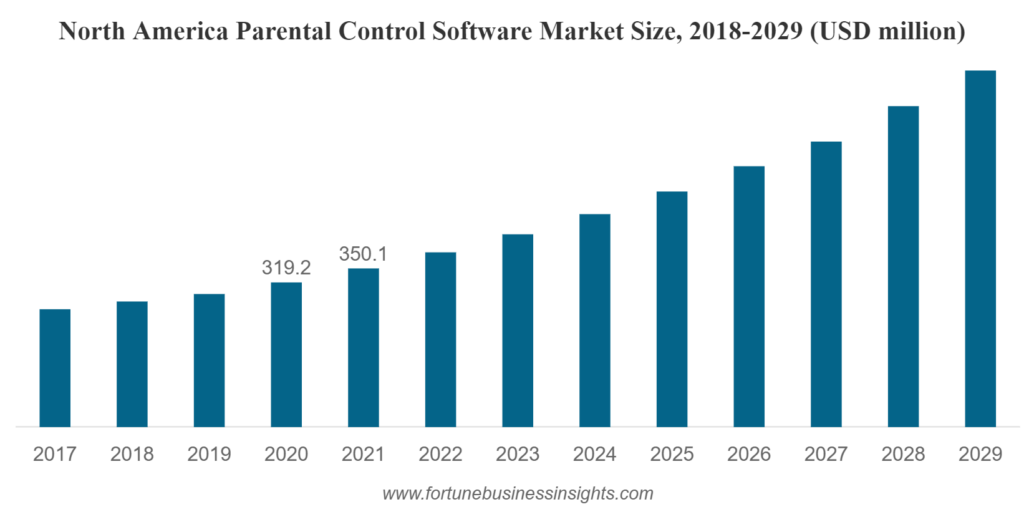
The best best parenting phone apps that are now key players in the parenting app market are:
- BabyGogo
- Baby Connect
- BABYTIME
- ivybaby
- Nighp Software
- The Bump
- MyMedela
- Ovia Health
- BabyCenter, L.L.C.
- Babytree
- WebMD
- Hello Belly
- Baby Nursing
- Kinedu
- Parent Cue
- Speech Blubs
- Cozi
- OurFamilyWizard
- TalkingParent
Let’s now look at the types of applications you can choose for your own custom app development project.
Types of apps for parents
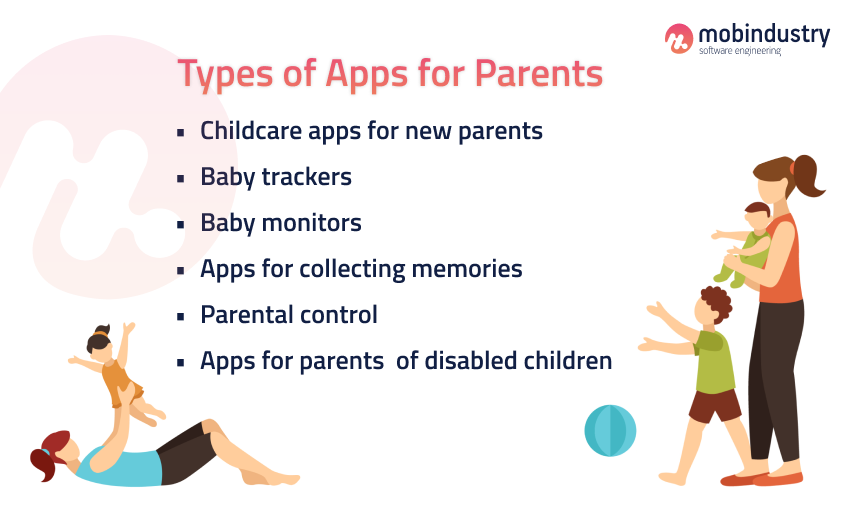
1. Childcare apps for new parents
Parenting is one of the biggest challenges a person can face in a lifetime. There are lots of things to care about, and it’s impossible to be 100% prepared to become a parent. Delivering a baby sure is hard, but the real difficulties begin afterward: breastfeeding, medications, baby massages, child development, education. Most of these issues are addressed by apps for new parents.
These applications are in essence databases with lots of information on childcare, daily advice, and even video tutorials. Often, these applications have some social features that allow parents to seek advice from others.
One example of an app for fresh parents is BabyGogo. This app is a pregnancy tracker that helps people get prepared for parenting before the baby is even born. And once it is, BabyGogo provides parents with daily advice and videos that answer lots of questions about the first year of a child’s life. There’s also a forum where parents can share their experiences and ask questions.
2. Baby trackers
Baby trackers help parents manage all the nuances of feeding and taking care of a child. These applications cover aspects like breastfeeding, diaper changing, and sleep.
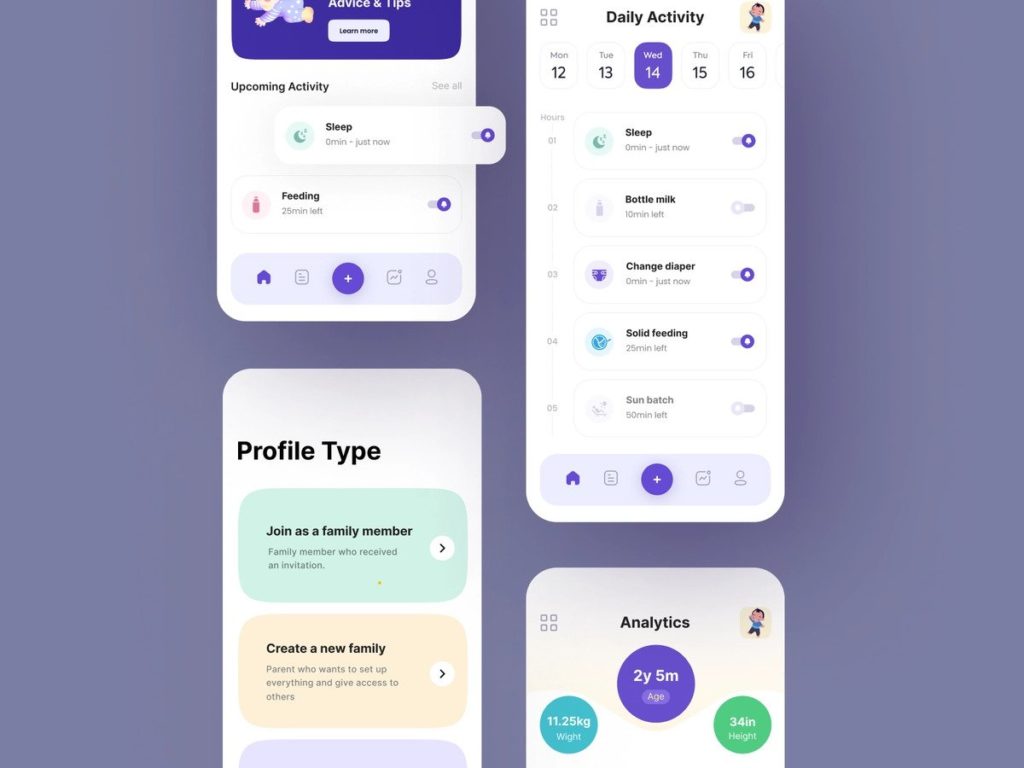
Baby trackers are one of the most useful types of apps for parents during the first few years of their children’s lives. One example of a baby tracker is the app simply called Baby Tracker, which includes trackers for breastfeeding, baby feeding, diaper changes, baby sleep, and baby care and also charts that show all this information in a statistical format.
Parents can also export all the statistics to an Excel document. The app works offline perfectly and its alarm makes sure that parents do everything on time.
3. Baby monitors
Sometimes it’s hard to put children to sleep, but even when a parent finally lulls their baby, they still want to make sure everything’s fine and that their baby isn’t too hot or too cold and that their sleeping position is safe. This is what baby monitors are for.
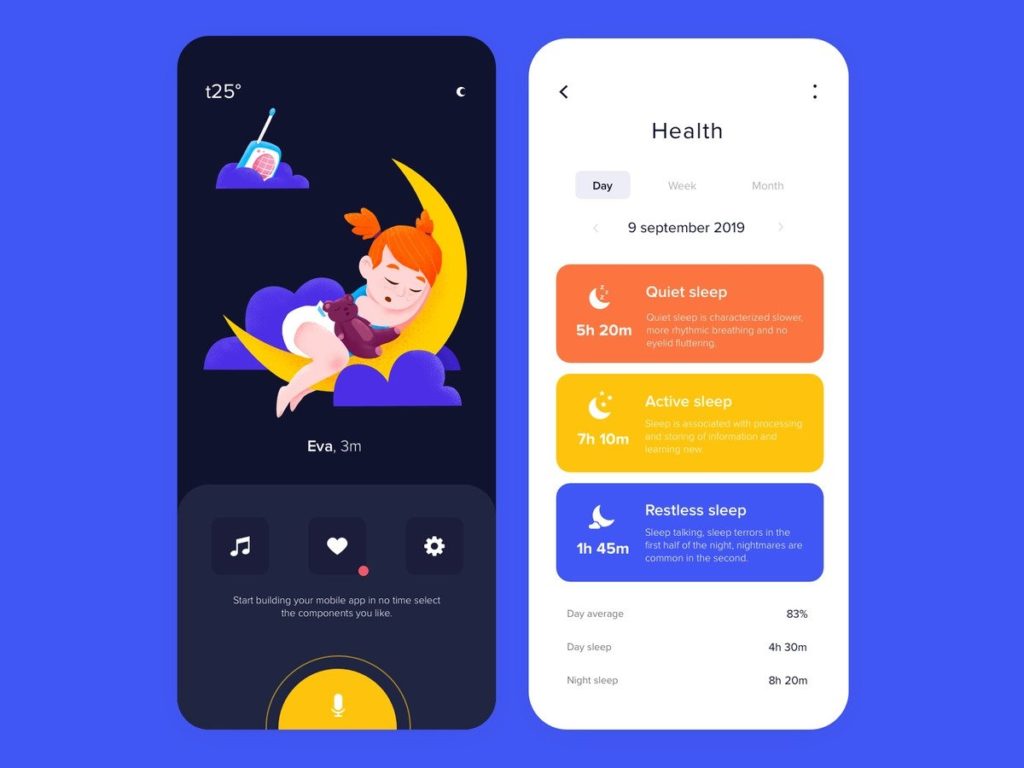
Such applications are live streaming apps that require two devices: one that records the video and the other that receives it via Wi-Fi or mobile internet. The recording device may be a tablet, smartphone, or special web camera. The receiver is usually a smartphone, but there are also apps that transmit the video to smart TVs.
The most famous example is Baby Monitor 3G, a video and audio nanny that allows parents to see their baby at any time using a smartphone, tablet, or computer. The app notifies parents when the baby is awake and gives valuable insights on how many times the baby woke up during the night.
4. Apps for collecting memories
Like nothing else, having a child means experiencing unique and wonderful moments. The first smile, word, and step — these milestones aren’t trivial, and parents naturally want to mark them and save the memories.
Many parents share photos of their children on social media, but not everyone wants to expose their parent-child relationship to a broad audience. Applications for collecting memories about the first years of a child’s life allow users to take photos and videos, make notes, and mark the most important milestones.
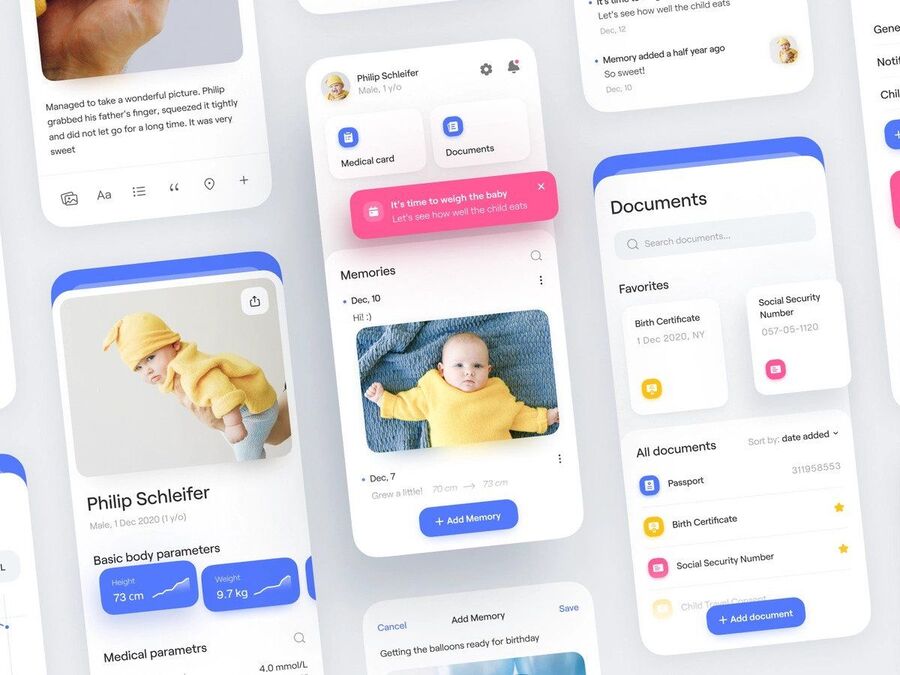
One of the best apps of this kind is Family Album Mitene, which allows users to share photos and videos of children only with family members in real time. It has social features like comments and visits that allow parents to see who has seen the photos. Albums organize photos and videos by date.
This application can also compile an original movie out of videos and photos and suggest monthly photo books that users can edit or create themselves.
5. Parental control
As a child grows up and starts spending time in front of a smartphone, parents become worried about inappropriate content on the internet. Parental control on mobile devices can be a good thing for both children and parents, but it shouldn’t be overused or else trust relationships between children and parents can be harmed.
Parental control applications block certain websites and applications and allow access to approved ones. These apps also prevent children from making in-app purchases and control screen time for kids.
One of the best examples of a parental control app is Kids Place. This app does everything mentioned above and more. It even allows parents to select daily limits for phone use.
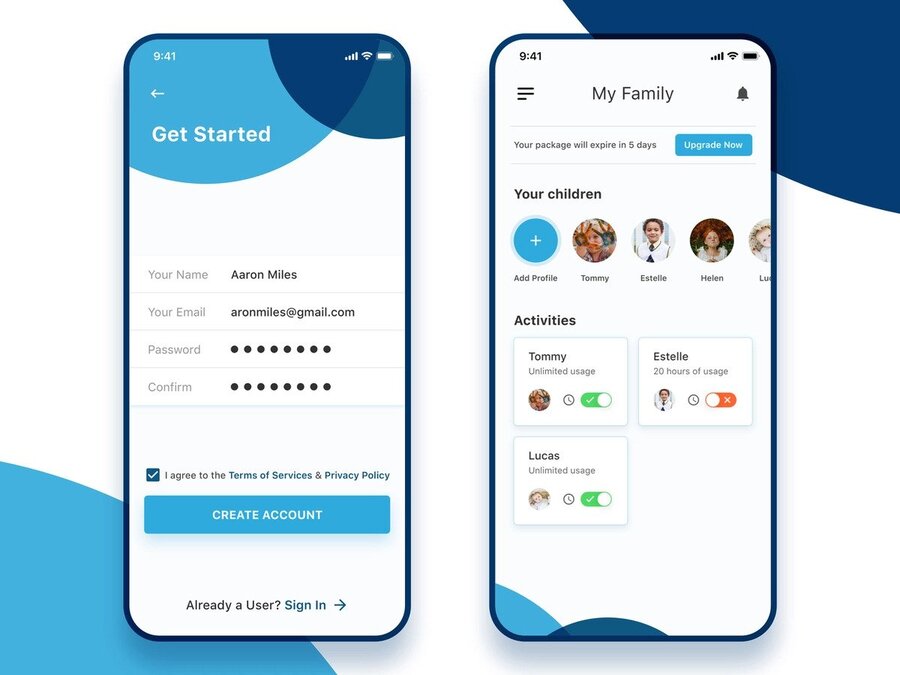
Other types of parental control apps are location tracking applications. They allow users to find out where their family members are at any moment and get notifications when they leave home or arrive at their destination.
For example, the Family Locator app lets parents know where their children are and vise versa. It also monitors the battery life of the smartphone being tracked. This lets parents know whether their child isn’t responding to calls or the battery is dead.
Family Locator also has a list exchange feature and a chat where users can message family members.
6. Apps for parents of disabled children
Learning disabilities and autism are the two leading types of mental disability among children. If a child has autism or a learning disability, it just means that they’ll need more attention in learning and everyday life.
Applications created by mental health specialists can help parents give their kids as much help as possible along the learning path.
For example, the Proloquo2Go app provides parents with general strategies and techniques that help autistic children succeed in learning.
These are basic types of mobile apps for parents that allow them to track their children’s development, mark milestones, get advice, and keep their children safe.
Final thoughts
There are thousands of aspects concerning parenting that you can address with a mobile app, providing solutions to issues parents might not even think about. Though there are currently many apps for parents, I’ve noticed that over 80% of them are poorly maintained or not maintained at all.
Maintenance and technical quality is very important when it comes to applications for parents. Parental control applications and baby monitors need to work perfectly with different devices and geolocation. If your application contains a lot of information, you also need to work on your app’s load speed.
As parents have many challenges to face during parenthood, it’s not too hard to come up with a mobile solution to help them. Make your application goal-oriented and clear so that parents know exactly what they’ll get if they use your app.


